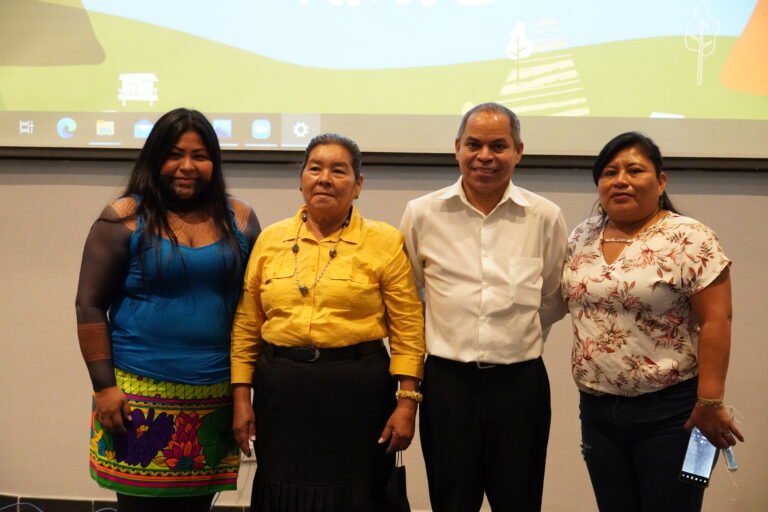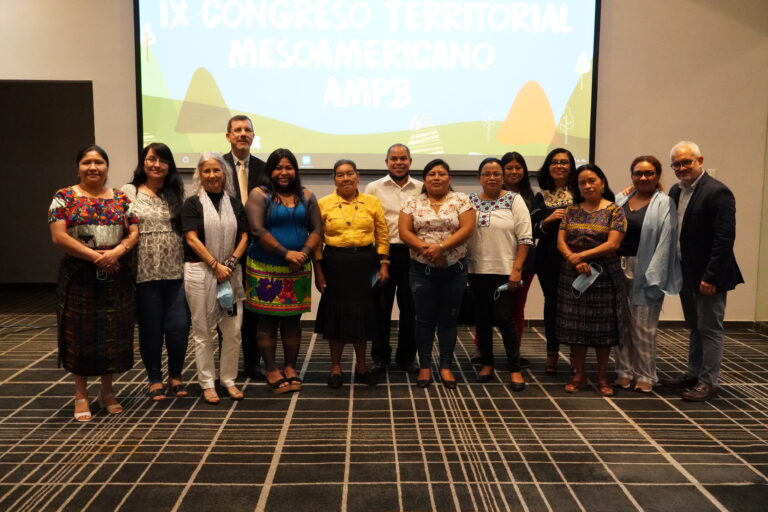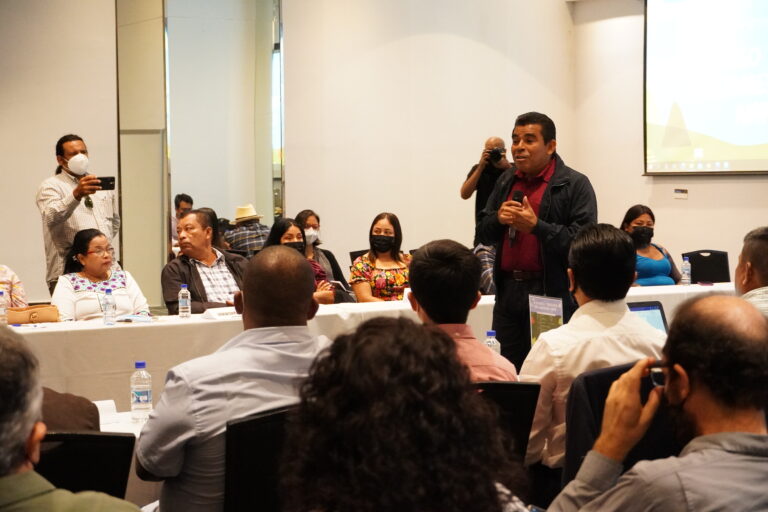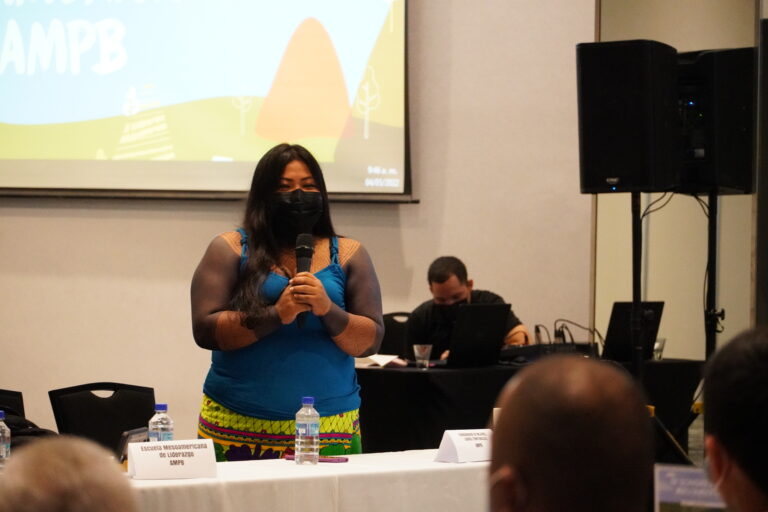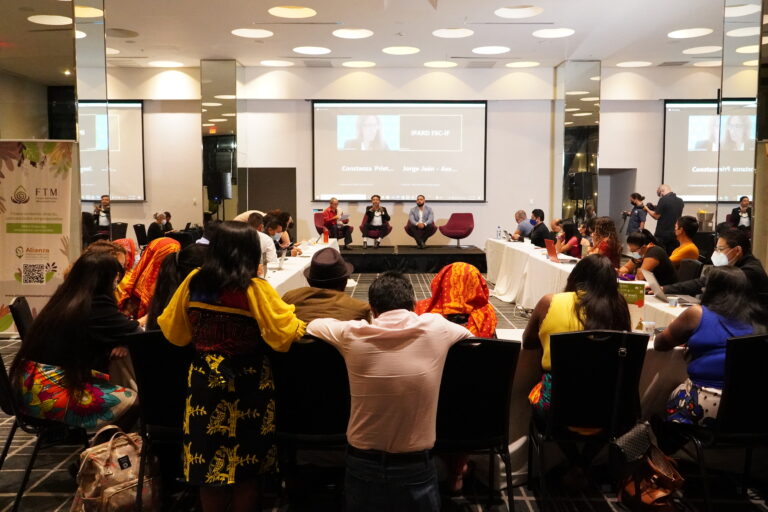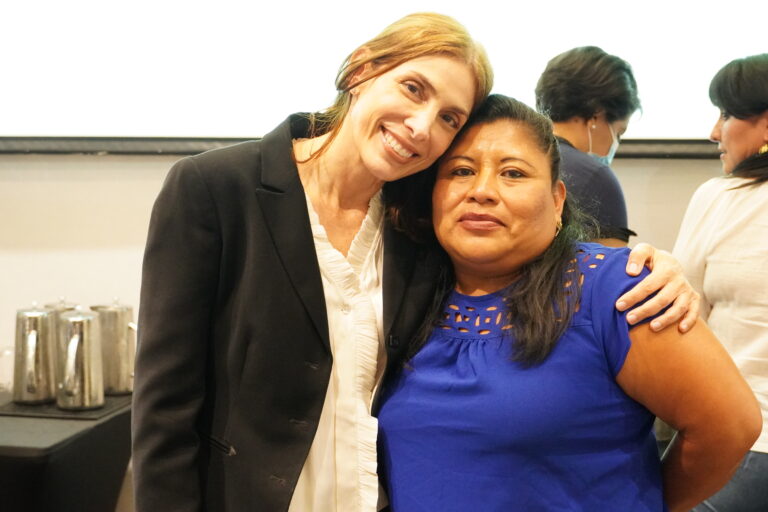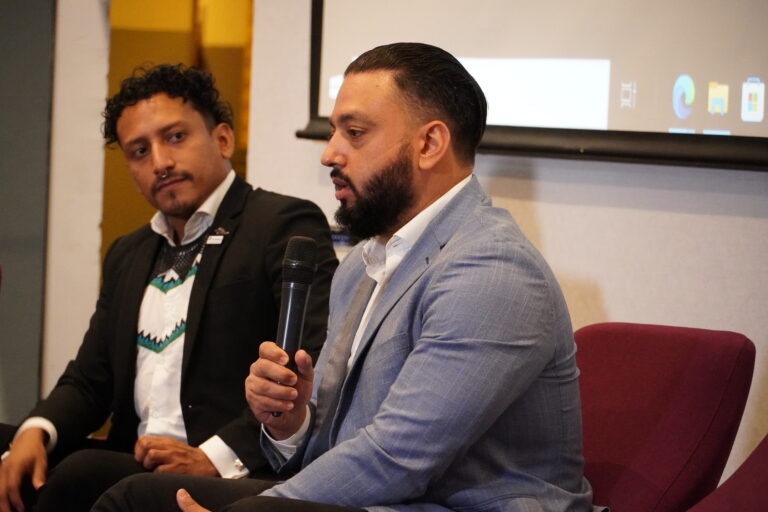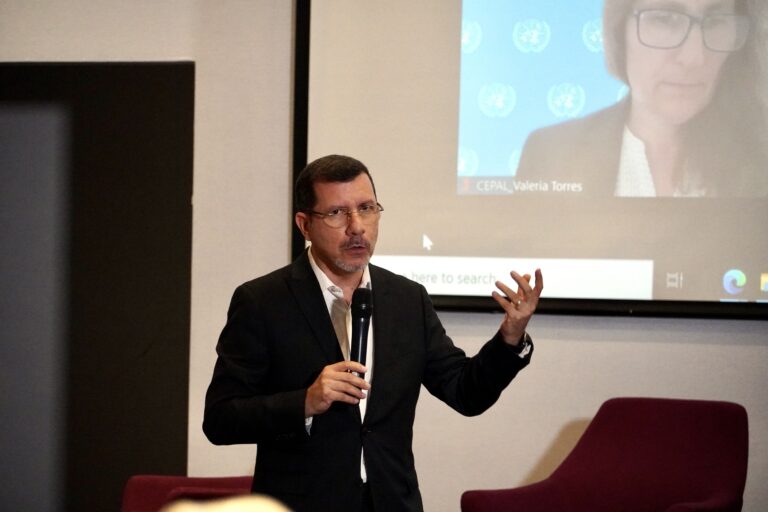The Rights of Nature and Indigenous Peoples: Challenges Towards Sustainable Development
The FSC Indigenous Foundation participated in the “First Regional Forestry and Sustainable Landscapes Congress” seeking to build a joint multisectoral agenda to combat the climate crises by the sustainable management of forests and biodiversity through the vision and needs of the Indigenous Peoples and local communities.
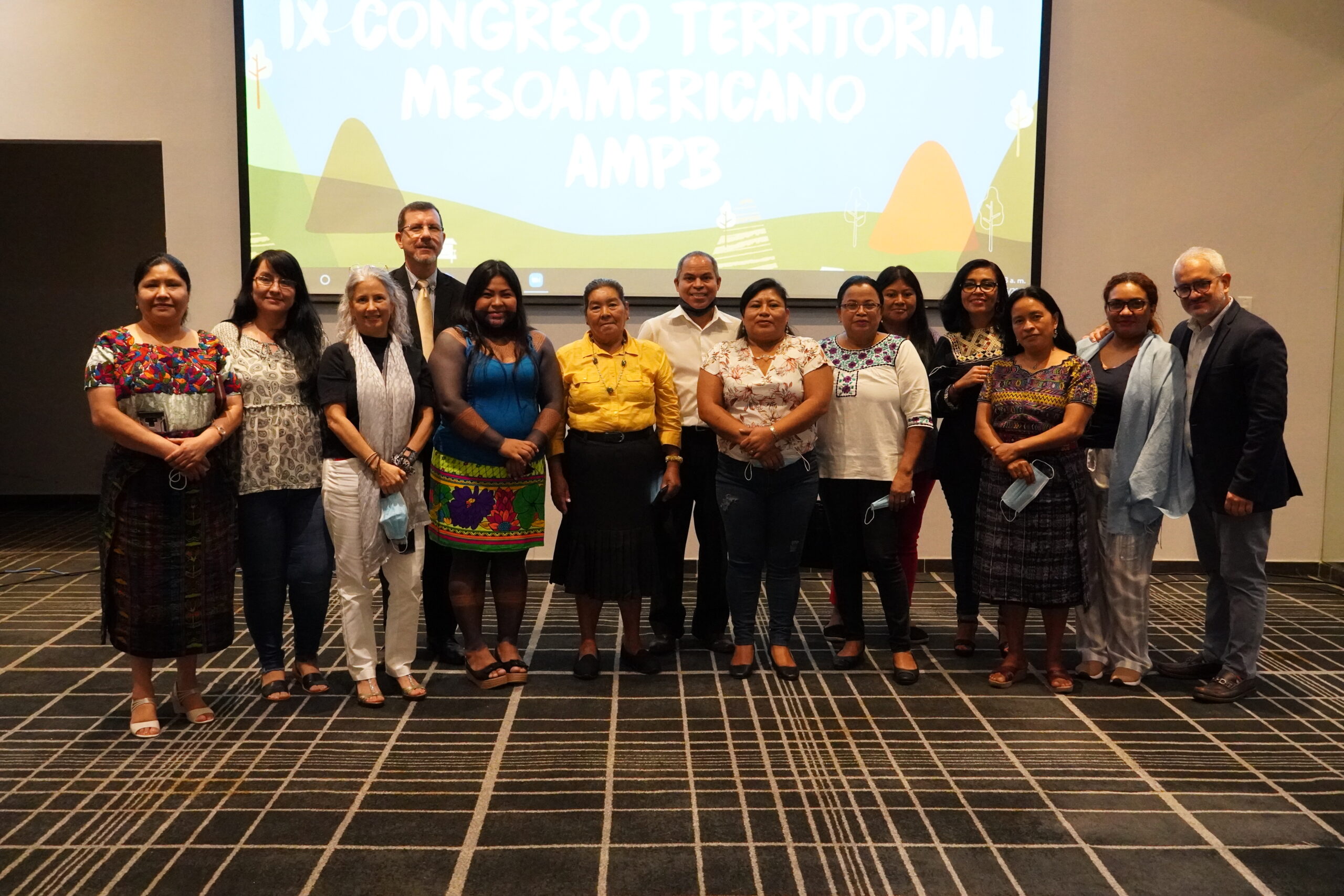
Panama City, Panama. The “First Regional Forestry and Sustainable Landscapes Congress” was held in Panama City from April 6 to 8. This event was part of a regional strategy to build a joint multisectoral agenda to combat climate change, to promote the sustainable management of the forests and biodiversity, and encourage innovative solutions to conserve nature and generate benefits for the local and Indigenous communities.
The Mesoamerican Alliance of Peoples and Forests (AMPB), the Central American Integration System (SICA), the Central American Commission for Environment and Development (CCAD), and the Ministry of the Environment of Panama led this initiative.
The technical and financial support for the event was provided by the FSC Indigenous Foundation (FSC-IF), the Indigenous Peoples Alliance for Rights and Development (IPARD) and other organizations and cooperation agencies, such as Rights and Resources Initiative (RRI), Climate and Land Use Alliance (CLUA), the Ford Foundation, Forest and Farm Facility (FFF), Forest Trends, the Prisma Foundation and Rainforest Foundation US.
This space for dialogue, reflection, and co-creation allowed to determine the challenged and opportunities Mesoamerica has by aiming to join forces to structure a course of action that includes and positions the vision of Indigenous Peoples and local communities as the main ax in all forest and biodiversity conservation strategies, so that countries in that region manage to achieve their goals and commitments established during international agreements.
Various modules occurred during the event that let the public know the mesoamerican reality, as well as the diverse proposals and successful experiences. As a result, the discussion on the importance of Indigenous Peoples and local communities participation in the management and forests conservation, biodiversity and other resources was deepened.
-
First Regional Forestry and Sustainable Landscapes Congress
Levi Sucre, Coordinator of the Mesoamerican Alliance of Peoples and Forests (AMPB), Sara Omi, President of the Mesoamerican Coordinating Committee of Women Territorial Leaders and Victor Francisco Cadavid, National Forestry Director of the Ministry of Environment of Panama, spoke at the opening of the event, emphasizing the importance of the space and highlighting the role of Indigenous Peoples and Local Communities.
“We Indigenous Peoples and local communities have a lot to contribute and we contribute from being guardians of the forests. We contribute to the knowledge of how we interact and live in the forests,” said Levi Sucre, coordinator of the AMPB.
In turn Sara Omi Sara, noted: “As women, we are concerned about and work on multiple challenges such as food security, the rescue of traditional knowledge and the transmission of that knowledge”.
Additionally, Francisco Souza, Director of the FSC Indigenous Foundation, highlighted the relationship of Indigenous Peoples with nature and the importance of their inclusion in the implementation of national policies and laws.
In this sense, Franciso Souza pointed out, “The importance of this discussion on the rights of Mother Nature is an important starting point to also think about the rights of Indigenous Peoples.”
Mauricio Mireles, FAO Policy Officer for Indigenous Peoples and Social Inclusion for Latin America and the Caribbean, opened the discussion with an introductory presentation in which he highlighted the contribution and challenges of Indigenous and forest communities in the protection of Mesoamerican forests. In his presentation he emphasized: “If we understand that there is effectiveness in ancestral knowledge, we understand why native peoples are the main defenders. If we do not support the protection that people do, we cannot expect conservation to continue.”
The first module addressed the coordination of public policy for forest conservation, economic development and climate change adaptation and mitigation. Here the successful experiences of some organizations in the region were presented. The following is a detail of the discussion.
Marcedonio Cortave, Executive Director of the Association of Forest Communities of Petén (ACOFOP) highlighted the contributions of Petén’s forest communities to the conservation of the Maya Biosphere Reserve, stressing that community governance is the basis for sustainable forest management. During his speech, Cortave stated: “It is the communities that have maintained the forests. Why? Because they are their livelihoods. They cannot be protected without the contribution of those who inhabit those areas.”
Sagladummad Anibal Sanchez, representative of the Guna General Congress, presented the achievements and challenges of the Integral Plan of the Indigenous Peoples of Panama, emphasizing the importance of linking the traditional knowledge of Indigenous Peoples in different areas, as a strategy to generate sustainable development models that include the needs and priorities of the communities, in this sense he emphasized: “Indigenous knowledge must be preserved and disseminated through education, in the areas of health, intercultural bilingual education and forest management.”
Amalia Hernández, President of the Federation of Agroforestry Producers of Honduras (FEPROAH), stressed the importance of generating strategic alliances to promote community forestry in her country, underscoring the need to listen to proposals from the communities that are on the front line of defense and action for the protection of forests.“The grassroots communities are and have always been the protectors of the forests. Therefore, we continue to advocate that we should be heard,” she said.
The second module of the Congress focused on the challenges of building a fair forestry market and respecting the rights of Indigenous and local communities. The experiences of organizations from Mexico, Honduras and the FSC were presented.
Gustavo Sánchez Valle, President of the Mexican Network of Peasant Forestry Organizations (MOCAF Network), presented the experience of community forest governance in Mexico and its relationship with legal timber. He stressed the importance of establishing national and international spaces for dialogue to create the necessary conditions to legalize the legal timber trade, “The legality of timber is a complex issue where different ministries of a country must participate and there must be cooperation between countries, so it is important that it is discussed in these spaces,” said Sánchez Valle.
During his presentation, Donaldo Allen, representative of Unity of La Moskitia (MASTA), highlighted the importance of community forest governance in Honduras as well as the inclusion of traditional knowledge in all processes: “Within the framework of respect, we must frame ourselves in a double manner: How we organize and coordinate traditional knowledge with academic knowledge without imposition.”
This module also featured the participation of Zandra Martínez, President of the FSC Board of Directors, who made an important contribution as a commentator on the panel. During her intervention she emphasized that the experiences presented show that there are great opportunities for the region. She also emphasized that FSC is a market tool available to Indigenous Peoples that has proven its effectiveness in communities in Guatemala and Mexico.
-
The FSC Indigenous Foundation and the IPARD Program as facilitators in the co-creation of long-term innovative solutions
As part of the work carried out by the FSC Indigenous Foundation and the IPARD Program so that Indigenous Peoples around the world can manage their territories and generate their own development models, the event entitled “The Rights of Nature and Indigenous Peoples: Challenges for Sustainable Development” was organized within the framework of the “First Regional Forestry and Sustainable Landscapes Congress”.
“The heart and vision of the strategy for IPARD is to promote cooperation and collaboration between different sectors to best support and, indeed, create or co-create long-term solutions together with and for Indigenous Peoples around the world.” Francisco Souza, Director of the FSC Indigenous Foundation.
The panel held on Thursday, April 7, deepened the discussion on the challenges and opportunities facing Panama for the implementation of the recently approved Law 287, which seeks to safeguard and promote the rights of nature. This event highlighted this milestone as a first step for the implementation of regulations and actions necessary for conservation that contemplate the vision and needs of Indigenous Peoples and local communities.
Juan Diego Vásquez, Deputy of the National Assembly of Panama, who drafted the proposal of Law 287, pointed out that one of the achievements of this law was “To include some specific norms and conventions for Indigenous Peoples who have dedicated themselves since many centuries ago to the protection and conservation of the environment.”
Similarly, other experts invited by the Foundation highlighted the valuable role of Indigenous Peoples and local communities so that this innovative Law, approved by the Panamanian Government last February, will transform the country’s reality and become the beginning of a great strategy aimed at promoting the socioeconomic development of the communities.
In the words of Victor Cadavid, National Forestry Director of the Ministry of Environment of Panama, “a regulation like this in our country is essential to underpin the socio-economic development towards the future, to be able to have rights over nature will indicate a protection, a greater safeguard that should be born definitely a direct participation of the Indigenous communities.”
According to Diwigdi Valiente, Head of Sustainability for Panama Tourism, it is necessary to open a space to discuss, manage questions and generate answers that allow: “to build a road map that identifies good practices and the main problems” in order to create economic development proposals for the Indigenous Peoples and Communities of the country.
Similarly, Valeria Torres Larranaga, Governance Affairs Officer (ILPES) / CEPAL, provided a comprehensive perspective on the problems, proposals and future outlook on this issue of local, regional and global relevance. During his presentation, he said: “Indigenous Peoples, who have a close relationship with nature, have a worldview that is essential for establishing climate change mitigation and adaptation measures and for addressing the reality of the climate crisis we are currently facing.”
Constanza Prieto Figelist, Latin America Legal Lead of the Earth Law Center, pointed out that the recognition of the rights of nature in several countries of the region creates links that allow connecting human rights with the rights of nature. Regarding the specific case of Panama, she points out that: “This law establishes a bridge between human rights and the recognition of the rights of nature, since in Latin America, constitutions normally only recognize the right to a healthy environment, and opens the door to ecological recognition, to the recognition of the intrinsic value of nature.”
For more information, we invite you to watch the complete event.
-
Context of Indigenous Peoples and the challenges of the Mesoamerican regional agenda
The Indigenous and local communities of Mesoamerica influence approximately 50 million hectares of forests that host 8% of the world’s biodiversity and store 47% of the region’s forest carbon stocks.
In this region there are about 5 million people who depend on forests.
These communities face diverse pressures and threats that jeopardize their lives and the permanence of vital forests to confront the climate crisis.
One of the main threats is the narco-deforestation that plagues Guatemala, Honduras and Nicaragua. According to several studies, this phenomenon generates a loss to an average of between 15% and 30% of forest loss in these three countries. Additionally, in the same countries, Indigenous and local community leaders are persecuted, criminalized and murdered for defending the Earth from this and other threats. According to the latest report presented by Global Witness, in 2020 there were 42 murders of nature defenders and most of them were Indigenous or community leaders.
The same report states that in Mexico, 30 lethal attacks against land and environmental defenders were documented in 2020, registering a 67% increase over 2019. Logging was linked to nearly a third of these attacks, and half of all attacks in the country were directed against Indigenous communities.
This harsh reality coupled with structural inequality, the effects of climate change and the effects of the health crisis have placed Indigenous and local communities in a situation of multiple and extreme vulnerabilities.
As a result, the regional multisectoral agenda, backed and supported by the FSC Indigenous Foundation, the IPARD Program, and other strategic allies, is facing diverse challenges of various natures, but also present an opportunity to build an effective course of action that allows to co-create innovative solutions from the front line communities’ perspective so that they can generate benefits in economic, environmental, social and cultural terms for the countries, Indigenous Peoples, local communities, and the private sector shareholders committed to the sustainable development.
First Regional Forestry and Sustainable Landscapes Congress
